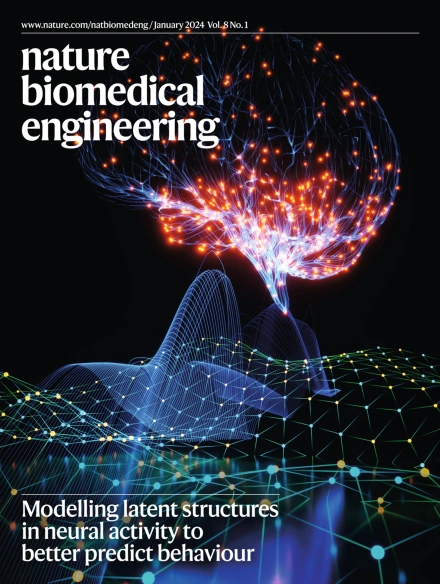Collagen-binding IL-12-armoured STEAP1 CAR-T cells reduce toxicity and treat prostate cancer in mouse models.
IF 26.8
1区 医学
Q1 ENGINEERING, BIOMEDICAL
引用次数: 0
Abstract
Immunosuppressive microenvironments, the lack of immune infiltration, and antigen heterogeneity pose challenges for chimaeric antigen receptor (CAR)-T cell therapies applied to solid tumours. Previously, CAR-T cells were armoured with immunostimulatory molecules, such as interleukin 12 (IL-12), to overcome this issue, but faced high toxicity. Here we show that collagen-binding domain-fused IL-12 (CBD-IL-12) secreted from CAR-T cells to target human six transmembrane epithelial antigen of prostate 1 (STEAP1) is retained within murine prostate tumours. This leads to high intratumoural interferon-γ levels, without hepatotoxicity and infiltration of T cells into non-target organs compared with unmodified IL-12. Both innate and adaptive immune compartments are activated and recognize diverse tumour antigens after CBD-IL-12-armoured CAR-T cell treatment. A combination of CBD-IL-12-armoured CAR-T cells and immune checkpoint inhibitors eradicated large tumours in an established prostate cancer mouse model. In addition, human CBD-IL-12-armoured CAR-T cells showed potent anti-tumour efficacy in a 22Rv1 xenograft while reducing circulating IL-12 levels compared with unmodified IL-12-armoured CAR-T cells. CBD fusion to potent payloads for CAR-T therapy may remove obstacles to their clinical translation towards elimination of solid tumours.胶原结合il -12装甲STEAP1 CAR-T细胞在小鼠模型中降低毒性并治疗前列腺癌
免疫抑制微环境、缺乏免疫浸润和抗原异质性对嵌合抗原受体(CAR)-T细胞治疗应用于实体肿瘤提出了挑战。以前,CAR-T细胞被免疫刺激分子(如白细胞介素12 (IL-12))包裹以克服这一问题,但面临高毒性。本研究表明,CAR-T细胞分泌的靶向人前列腺6跨膜上皮抗原(STEAP1)的胶原结合结构域融合IL-12 (CBD-IL-12)在小鼠前列腺肿瘤中保留。与未修饰的IL-12相比,这导致高肿瘤内干扰素-γ水平,没有肝毒性和T细胞浸润到非靶器官。在cbd - il -12装甲CAR-T细胞治疗后,先天和适应性免疫区均被激活并识别多种肿瘤抗原。在一个已建立的前列腺癌小鼠模型中,cbd - il -12装甲CAR-T细胞和免疫检查点抑制剂的组合根除了大肿瘤。此外,与未经修饰的IL-12装甲CAR-T细胞相比,人类cbd -IL-12装甲CAR-T细胞在22Rv1异种移植物中显示出强大的抗肿瘤功效,同时降低循环IL-12水平。CBD融合到CAR-T治疗的有效载荷可能会消除它们在消除实体肿瘤的临床转化中的障碍。
本文章由计算机程序翻译,如有差异,请以英文原文为准。
求助全文
约1分钟内获得全文
求助全文
来源期刊

Nature Biomedical Engineering
Medicine-Medicine (miscellaneous)
CiteScore
45.30
自引率
1.10%
发文量
138
期刊介绍:
Nature Biomedical Engineering is an online-only monthly journal that was launched in January 2017. It aims to publish original research, reviews, and commentary focusing on applied biomedicine and health technology. The journal targets a diverse audience, including life scientists who are involved in developing experimental or computational systems and methods to enhance our understanding of human physiology. It also covers biomedical researchers and engineers who are engaged in designing or optimizing therapies, assays, devices, or procedures for diagnosing or treating diseases. Additionally, clinicians, who make use of research outputs to evaluate patient health or administer therapy in various clinical settings and healthcare contexts, are also part of the target audience.
 求助内容:
求助内容: 应助结果提醒方式:
应助结果提醒方式:


